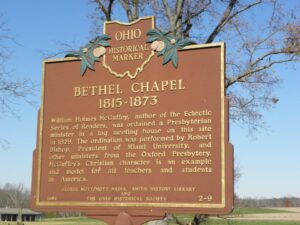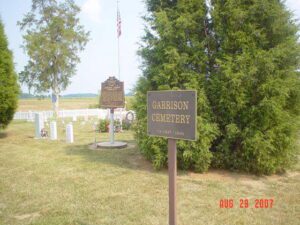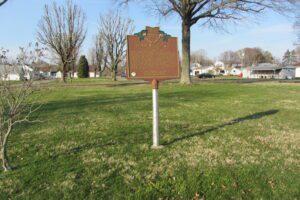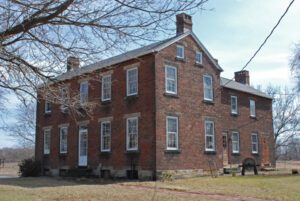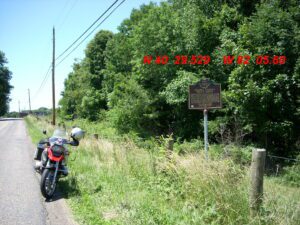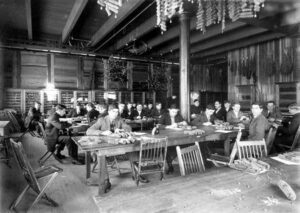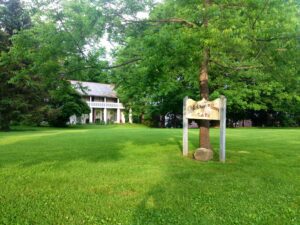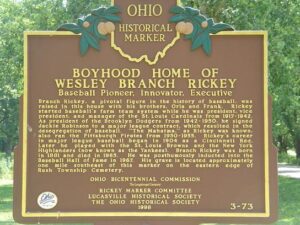, OH
William Holmes McGuffey, author of the Eclectic Series of Readers, was ordained a Presbyterian minister in a log meeting house on this site in 1829. The ordination was performed by Robert Bishop, President of Miami University, and other ministers from the Oxford Presbytery. McGuffey’s Christian character is an example and model for all teachers and students in America.
, OH
Descendants of Lemuel Garrison Sr., a Revolutionary War soldier, were among the first Europeans to own and settle land at Garrison Corner (intersection of State Route 123 and Shawnee Trace) . Garrison Cemetery burials took place from ca. 1837 to 1936. The cemetery has 327 lots. Eighty-six burials are documented including veterans John J. Garrsion, Benjamin Garritson, James Knicely, Nicodemus Rude, and William Rude. (continued on other side)
, OH
George Washington Crile was born in 1864 at Chili, in Crawford Township, Coshocton County. Before embarking on his notable medical career, he graduated from Northwestern Ohio Normal School (now Ohio Northern University) at Ada, teaching for two years before becoming principal at Plainfield School. Crile first studied medicine under village physician Dr. A.E. Walker, who loaned him medical books and took him on calls to visit rural patients. Later in life Crile credited his early experience in education in Plainfield as one of the most influential points in his career. (continued on other side)
, OH
Maple-Dell was the home of John Butler, a Quaker who expressed his religious faith by working for humanitarian causes. An early Goshen Township teacher, Butler opened his home to orphans, the homeless, and runaway slaves, and devoted 20 years of his life to support the Freedman’s Camps for former slaves. One of the many individuals he sheltered was Edwin Coppock who was hung along with abolitionist, John Brown, after the raid on Harper’s Ferry in 1859. Butler met with President Lincoln and Secretary of War, Edwin Stanton in 1862 to request exemption from military service for Quakers during the Civil War. In 1868, President Grant petitioned the churches to assist in organizing a peace policy for the Indians. Butler prepared and presented to Congress a proposal for treating the Indians humanely including providing them with scientific and industrial education.
, OH
On French Ridge in Richland Township, on June 5, 1863, local citizens in defiance of conscription attacked Elias Robinson, an enrolling officer of the Union Army. When Captain James Drake, the provost marshal, imprisoned the ringleaders, armed locals released them. Colonel William Wallace of the 15th Ohio Volunteer Infantry was sent to the scene with a force of 420 soldiers from Camp Chase in Columbus. On June 17, the soldiers approached the fortified camp of nearly one thousand malcontents. After firing upon the soldiers, the “rebels” scattered with only a few captured or wounded. The next morning, local Peace Democrats, led by politician Daniel P. Leadbetter, negotiated a surrender of the ringleaders. More than forty people were indicted for involvement in the rebellion, but only Lorenzo Blanchard, owner of the farm where the camp was located, was found guilty. Once this riot at “Fort Fizzle” ended, resistance to the draft in Holmes County subsided.
, OH
A. B. Graham, superintendent of Springfield Township Rural schools in Clark County, established the Boys and Girls Agricultural Experiment Club, which revolutionized agricultural education and non-formal youth development methods. The first meeting of the club, said to be the nation’s first farm club for young people, was held at this site on January 15, 1902 in the basement of the Clark County Courthouse. This was the start of what would be called a 4-H Club a few years later. Through the years, the overall objective of A.B. Graham and 4-H has remained the same: the development of youth as individuals and as responsible and productive citizens.
, OH
Robert Caldwell and his family, from Chester County, Pennsylvania, moved to the Northwest Territory in 1795. In 1809, they bought and cleared land along Duck Creek in what became Olive Township, Morgan County (in 1819). In 1832 Robert’s son, Samuel and his wife Sarah Brownrigg Caldwell built the “Ball-Caldwell” house. Samuel Caldwell advocated for the formation of Noble County, established in 1851. In the contest to determine the site of the county seat, Caldwell promised a donation of land if it would be used for that purpose, which is was in 1857. In gratitute, the commissioners named the county seat “Caldwell.”
, OH
Branch Rickey, a pivotal figure in the history of baseball, was raised in this house with his brothers, Orla and Frank. Rickey started baseball’s farm team system while he was president, vice president, and manager of the St. Louis Cardinals from 1917-1942. As president of the Brooklyn Dodgers from 1942-1950, he signed Jackie Robinson to a major league contract, which resulted in the desegregation of baseball. “The Mahatma,” as Rickey was known, also ran the Pittsburgh Pirates from 1950-1955. Rickey’s career in major league baseball began in 1904 as a Cincinnati Red. Later he played with the St. Louis Browns and the New York Highlanders (now known as the Yankees). Branch Rickey was born in 1881 and died in 1965. He was posthumously inducted into the Baseball Hall of Fame in 1967. His grave is located approximately one mile southeast of this marker on the eastern edge of Rush Township Cemetery.


